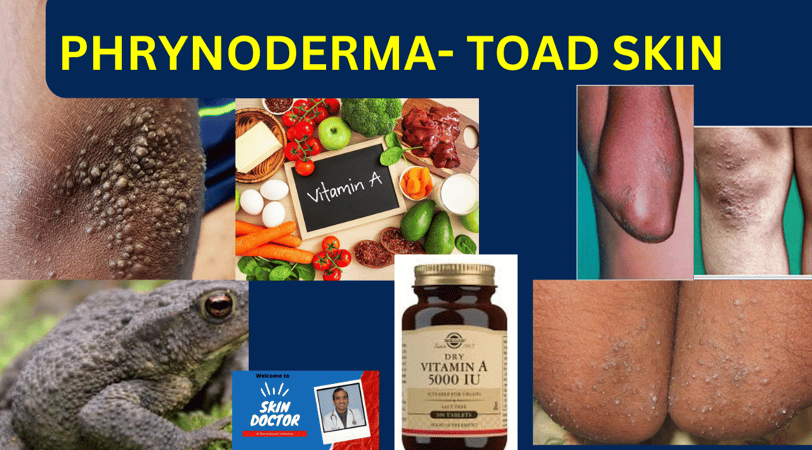what is Phrynoderma
Phrynoderma, often referred to as "toad skin," is a rare skin disorder characterized by small, follicular, keratotic papules that give the skin a rough texture. The name itself is derived from Greek words – "phrynos," meaning toad, and "derma," referring to the skin. This condition is a form of follicular hyperkeratosis, which means an excessive buildup of keratin around hair follicles.
Dr.Sujith karimbil
8/19/20232 मिनट पढ़ें


Decoding Phrynoderma: Understanding Symptoms, Causes, and Management
Introduction: Welcome back to the SkinDoctor channel blog! Today, we're diving into an intriguing skin condition that might not be as well-known as some others but is worth exploring: Phrynoderma. This unique condition has distinctive features that set it apart, and we're here to shed light on its symptoms, causes, and management. Let's embark on this journey of understanding together.
What is Phrynoderma? Phrynoderma, often referred to as "toad skin," is a rare skin disorder characterized by small, follicular, keratotic papules that give the skin a rough texture. The name itself is derived from Greek words – "phrynos," meaning toad, and "derma," referring to the skin. This condition is a form of follicular hyperkeratosis, which means an excessive buildup of keratin around hair follicles.
Symptoms and Appearance: Phrynoderma usually appears as a bumpy, rough skin texture resembling the skin of a toad, hence the nickname. The papules can range in size and are often found on the outer arms, thighs, buttocks, and other areas exposed to friction. The condition may also cause dryness, itching, and mild discomfort.
Causes of Phrynoderma: Although the exact cause of Phrynoderma is not fully understood, it's often associated with nutritional deficiencies, particularly a lack of vitamin A and essential fatty acids. These nutrients play a crucial role in maintaining healthy skin, and their deficiency can lead to the characteristic skin changes seen in Phrynoderma.
Nutritional Deficiencies and Phrynoderma: Vitamin A deficiency is closely linked to skin health, as it supports normal cell turnover and maintains the integrity of the skin barrier. Essential fatty acids, such as omega-3 and omega-6, also contribute to skin hydration and overall health. A diet lacking in these nutrients can pave the way for Phrynoderma to develop.
Management and Treatment: Addressing the underlying nutritional deficiencies is key to managing Phrynoderma. If you suspect you have this condition, consulting a dermatologist is essential. They can conduct tests to determine if you have deficiencies and recommend appropriate supplements or dietary adjustments.
Prevention and Holistic Health: Preventing Phrynoderma involves maintaining a well-balanced diet rich in essential nutrients. Including vitamin A-rich foods like carrots, spinach, and sweet potatoes, as well as sources of essential fatty acids like fish, nuts, and seeds, can contribute to healthy skin.
Conclusion: Phrynoderma may be a lesser-known skin condition, but understanding its symptoms, causes, and management is crucial for anyone experiencing its effects. Remember, your skin's health is often a reflection of your overall well-being, and prioritizing a balanced diet can go a long way in ensuring its vitality. If you suspect you have Phrynoderma or any skin concerns, don't hesitate to reach out to a dermatologist for professional guidance and care.
